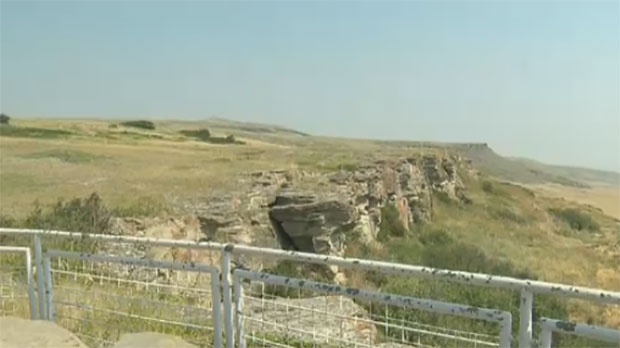Senate committee members studying soil across Canada stop in southern Alberta
A senate committee looking into the status of soil health in Canada made its way to the prairies, including southern Alberta, this week.
Four senators first stopped in Saskatchewan and are now looking at native grass lands on Bill Newton's ranch east of Fort Macleod, in an area known as Spring Point, Alberta.
"Soil profiles are different across this country and so policies programs need to be different as well and so setting a baseline is very important," said Senator Rob Black, the committee chair.
"What they do here, we don't do in southwestern Ontario," he added, "so it's important to know and see how soil health is being looked after, how our soils are being looked after across this country."
Black said the last senate soil study was done in 1984 and it's important for the committee to see what conditions are today.
"We've also been to Guelph in Ontario and learn more about what's happening in University of Guelph," he said. "Some of us have been to Nova Scotia, some of us have been to Rome to an international conference and this is a western leg."
'DEEP HISTORY'
Senator Paula Simons, a longtime former Edmonton Journal columnist, is the committee co-chair. She met Newton in the provincial capital a few years ago and was invited to see his ranch in person.
"I also wanted my Senate colleagues to see Head-Smashed-In Buffalo Jump," she said. "So that they could understand the deep history of this land and the deep history of grazing culture on this land, which certainly pre-dates the arrival of ranchers."

Senator Simons says visiting this ranch is incredibly different than what a farm in eastern Canada looks like and has different soil concerns to sustain the native grasses that grow in the region.
"For thousands and thousands of years people have used this pasture land to feed themselves first with bison and elk and now with beef," said Senator Simon. "Natural grasslands sequester carbon, at least if they're grazed properly and they can be every bit if not more important in the fight against climate change as planting trees."
Bill Newton is leading the tour and showing the committee members the native grass and the soil it grows in.
"You always have to balance how are we going to feed the world's population with maintaining our soils or improving our soils and keeping our ecological function, it's very challenging to create the balance," he said.
"When we lose (the native grass), we lose not only carbon that's stored in the soil and soil quality, but we also lose other ecological functions, we lose biodiversity, we probably don't function as well in the water cycle with other the with other crops so all of those are things that drive my interest in doing this.))
Newton says it's important for everyone that soil is recognized as a natural resource and needs to be understood and protected.
The senate committee will continue their fact finding mission in Alberta for the rest of the week and all the information they've gathered will be presented in a report to the federal government in 2024.
CTVNews.ca Top Stories

Possible scenarios that could play out in Ottawa as the Liberal government teeters
Prime Minister Justin Trudeau is said to be reflecting on his future over the holidays after the resignation of his top cabinet minister, Chrystia Freeland, in mid-December. The bombshell move prompted a fresh wave of calls for Trudeau to step down as Liberal leader from inside and outside the caucus.
5 things we know and still don't know about COVID, 5 years after it appeared
The virus is still with us, though humanity has built up immunity through vaccinations and infections. It's less deadly than it was in the pandemic's early days and it no longer tops the list of leading causes of death. But the virus is evolving, meaning scientists must track it closely.
The man who died in a Las Vegas Cybertruck was shot in head before explosion, sheriff says
The person inside the Tesla Cybertruck blown up outside U.S. President-elect Donald Trump's Las Vegas hotel suffered a gunshot to the head before the explosion, Clark County Sheriff Kevin McMahill said Thursday. McMahill said a handgun was found at his feet.
Woman, father killed on New Year's Eve were victims of intimate partner violence: Halifax police
Halifax police are investigating three deaths that are connected – two of which they say were homicides resulting from intimate partner violence – in the city on New Year’s Eve.
Mounties investigate discovery of 'very small pipe bomb' in Kamloops, B.C.
Mounties are investigating and appealing for witnesses after an explosive device was discovered Wednesday on a beach in Kamloops, B.C.
LIVE UPDATES FBI says the New Orleans truck attacker acted alone in an 'act of terrorism'
The FBI now says the New Orleans truck attacker acted alone in an 'act of terrorism' when he drove a pickup truck into a crowd of New Year's revellers early Wednesday, killing 14 people.
Sask. RCMP locate missing inmate of Yorkton prison
An inmate who was wanted for being unlawfully-at-large after not returning to Whitespruce Provincial Training Centre in Yorkton has been found and arrested.
FORECAST Weather warnings issued in 7 provinces and territories
Wintry weather conditions, including heavy snow and wind chill values around -55, prompted warnings in seven provinces and territories Thursday.
Who are Canada's top-earning CEOs and how much do they make?
Canada's 100 highest-paid CEOs earned $13.2 million on average in 2023 from salaries, bonuses and other compensation, according to the Canadian Centre for Policy Alternatives.

































